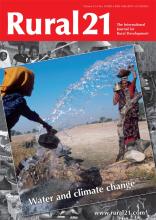/ library resources
Showing items 1 through 8 of 8.Sierra Leone is one of the least developed countries in the world and is still recovering from a civil war that ended in 2002.
The buying up of farmland by international investors is viewed highly critically. However, sweeping judgements could be inappropriate, as our author demonstrates with survey results from Ethiopia and Uganda.
Since the 2008 food price crisis, foreign investors have been acquiring more and more land in poor countries for producing foodstuffs and biofuels for their own use. Such investments have the potential to promote rural development and food security worldwide.
Large land acquisitions can have a deep, lasting e? ect on livelihoods, food security and the future of agriculture, so there is a need for strategic thinking, vigorous public debate and government responsiveness to public concerns, especially in recipient countries
African Governments are planning to leapfrog development and move to a middle income economy in a short time.
In many Asian, African, and South American nations, indigenous people are being driven from their homes: Government authorities are leasing hundreds of thousands of hectares of land belonging to indigenous people who only in the rarest of cases possess deeds to the land that are recognised by the
The world food crisis has spurred foreign direct investments (FDI) into arable land in developing countries. While significant financial inflows into agricultural sectors could be beneficial on a global scale, it could negatively affect local livelihoods.
Development assistance is contingent upon the efficiency and effectiveness of delivery mechanisms. EU regional policy offers an appealing paradigm of how to achieve tangible outcomes with sound financial management
Land Library Search
Through our robust search engine, you can search for any item of the over 73,000 highly curated resources in the Land Library.
If you would like to find an overview of what is possible, feel free to peruse the Search Guide.





